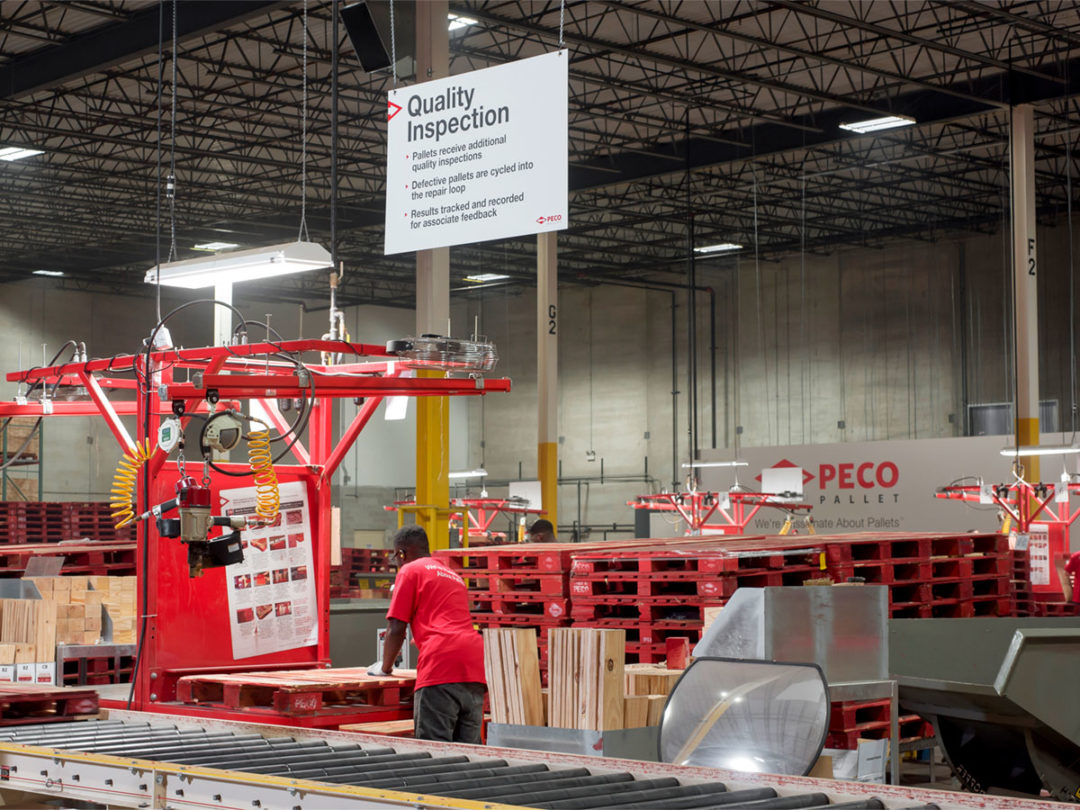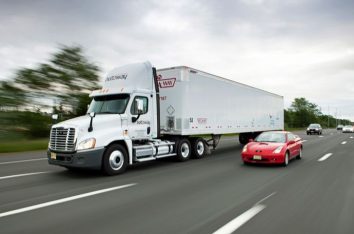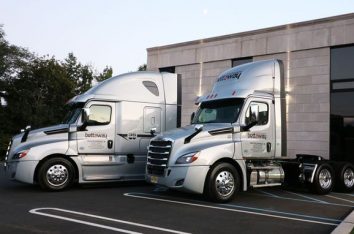Rising pallet-supply costs led two innovative suppliers to throw out the old playbook and design a new solution for their clients. The result: a “hybrid” pallet-supply model that slashed one customer’s costs by 31%.
Gary Frantz, DC Velocity, Dec 7, 2020. Full article.
The pallet pool business has long been the behind-the-scenes grease that lubricates the movement of literally billions of pounds of goods through the world’s supply chains. This underappreciated workhorse is the key to efficiently moving large lots of carton-based goods and other packaged and unpackaged products in and out of trucks, between production plants and distributors, within warehouses, and out to retail stores.
It is a market of two universes. In one universe is the traditional “white wood” pallet, typically purchased by a manufacturer, long relied upon by large beverage producers and consumer goods companies, and supported by third-party pallet recapture services. Manufacturers often build pallet inventories in advance so they can be deployed on demand to production lines as goods are produced.
While the manufacturer technically owns the pallets, once they get loaded and shipped out, it’s anybody’s guess when—or if—the owner will see those assets again. A pallet might sit in a retailer’s or distributor’s warehouse for several weeks or more. Or it might move “downstream” to a retail store or smaller end-user, from which it doesn’t return. “It’s a cost of doing business that is built into the price of the product. Once it’s out of [the manufacturer’s] orbit, they forget about it,” says John Vaccaro, president of South Plainfield, New Jersey-based Bettaway Pallet Systems Inc., of white wood pallets.
Practically speaking, white wood pallets often are treated much like disposable dunnage, cardboard, or packing material. Yet, at an average cost of $7 for a refurbished pallet or $14 for a new one, expenses add up quickly when you’re talking about hundreds of thousands of pallets, notes Vaccaro, whose company operates a nationwide network of pallet-supply “partner depots,” over 475 of them in North America, where white wood pallets are returned, repaired, refurbished, and staged for redeployment. Its clients include such household names as Arizona Beverage Co., maker of Arizona Iced Tea, for whom Bettaway has managed transportation and pallet logistics for nearly 30 years.
A GROWING MARKET FOR RENTALS
In the other universe is the rental market. Rather than purchase the pallet, a manufacturer or distributor rents the unit. The rental pallet provider builds and maintains a fleet of reusable pallets, tracks them through the supply chain, and then, once the pallets are unloaded at the destination distributor or warehouse, picks them up and returns them to a staging facility, where they are inspected, repaired, repainted, and put back into circulation.
Under this model, the renting entity (such as a manufacturer, big-box retailer, or distributor) pays an “issue” fee and a rent-per-day fee plus other associated costs, such as a fuel surcharge. The manufacturer also has an obligation to report to the rental pallet provider when the pallet is transferred or released to a retailer’s location and is available for return.
Demand for rental pallets grew as the retail market evolved and distributors, beverage makers, and manufacturers of other consumer goods and consumables began selling more product directly to mega-retailers like Walmart and club stores like Costco. Owning white wood pallets no longer fully met the need.
Shippers also wanted the option of a more robust and standard pallet, or “block” pallet, and a national supply and management network for those rental pallets. Enter PECO Pallet.
PECO (the name is an acronym for “Pallet Exchange Co.”) operates a closed-loop pallet pool. It builds and maintains a fleet of reusable nine-block, four-way-entry, edge-rackable pallets that can carry up to 2,800 pounds apiece.
Within its network, PECO has some 2,100 pallet-recovery locations, including 42 full-service depots and 44 sort facilities strategically located throughout the U.S. and Canada. The company maintains a rolling inventory of roughly 21 million pallets. PECO counts among its customers major food and consumer goods producers like TreeHouse Foods, Hershey’s, Dole Fresh Vegetables, The Kraft Heinz Company, and Mars.
“The manufacturer or distributor gets a high-quality pallet at the lowest landed cost,” says Joe Dagnese, PECO’s president. “The customer benefits from a highly engineered pallet, ideally suited for high-velocity automated material handling systems, providing superior efficiency as well as improved safety, utility, operational consistency, and production-line optimization.”
ENTER THE HYBRID MODEL
Convention has held that the pallet business was divided into two models: One set of customers was on the purchased white wood model, and another on the block-pallet rental model. There was little incentive to mix. Most companies don’t want to deal with both owned and rental pallets. The logistics challenges are too complex, the savings inconsistent or unverifiable.
But that didn’t stop Bettaway’s Vaccaro from pursuing just such a scheme a few years back. Despite the conventional wisdom, he believed that several of his white wood pallet pool customers could benefit financially from some type of mixed service. As their markets shifted and business grew, some of those clients were seeing steep hikes in pallet costs. Vaccaro felt that by strategically carving out specific segments of Bettaway’s business and redeploying them in a rental network, Bettaway could deliver an overall lower landed cost to serve.
One of the clients he had in mind was Arizona Beverages. Arizona’s business, already utilizing some 2 million pallets annually, was growing and requiring an increasing number of new white wood pallets, Vaccaro recalls. “Brand-new pallets come at a premium cost. When you are refreshing the pool with 10% new and 90% refurbished, you can justify it,” he explains. “But when you get up to 30% or 35% new, the math doesn’t work.”
Bettaway also had manufacturer and distributor customers with remote locations, inconsistent production, or minimal, short-term pallet needs. Those “one offs” can be costly to serve with an all-white wood solution but were ideal for a tailored rental program. And customer footprints change; some sites drop out while others are added, requiring adjustments to pallet pools. “We had to think in other terms, alternatives we had perhaps rejected in the past,” Vaccaro says. Those alternatives included partnering with an outside party to provide rental pallets for some segments of Bettaway’s business.
That led to a meeting with PECO’s Dagnese.
“It was an exercise in collaboration, innovation, and material handling engineering,” Vaccaro says of their initial talks. “We looked at the size of the prize, if we could be flexible and nimble enough, where we could potentially work together … and what it would mean for the client. We could not afford any degradation in service, quality, or reliability,” he emphasized.
Bettaway and PECO assembled a team to tackle the project. Their mission: design a system that struck a balance between the faster-moving, quick-turn products and “one-off” locations served by PECO’s rental network; and the slower-moving, often higher-volume products going to distributors or larger retailers and held for longer periods, on white wood. “Where was the point at which we got the balance just right, so we did not have a slow-moving SKU (stock-keeping unit) on a rental pallet or weren’t shipping to a non-participating distributor, where the pallet would likely get lost or not returned?” asked Vaccaro.
“The manufacturer just wants the right number of high-quality pallets at the best cost delivered on time to its facilities,” says Dagnese. “And the retailers want the pallets retrieved from their facility without delay, so they are not taking up valuable warehouse space.”
The two companies launched a pilot of a new “hybrid” or blended pallet-supply model for Arizona Beverages in August 2018, focused on high-velocity product.
The pilot proved out the concept. The hybrid model maintained high quality standards and actually improved service for some lanes and markets. On a net basis, the blended model helped Bettaway reduce overall pallet landed cost to serve, across Arizona Beverages’ network of plants and distributors, by 31%.
Another advantage was the precision fit of PECO’s highly engineered and durable pallets with Bettaway’s material handling systems. Sophisticated robot-like machines automate the loading of packaged iced-tea product onto pallets, which then move through the plant on automated conveyors, eventually arriving at the loading dock for staging onto trucks. “The pallets fit like a glove, and we had zero pallet integrity failures,” says Dagnese.
A CONCEPT PROVEN; A MARKET CREATED
Dagnese and Vaccaro are excited about the opportunity to expand the hybrid model to more shippers. “We think there are numerous co-selling opportunities with existing customers of both PECO and Bettaway,” Dagnese says.
Vaccaro agrees. “I hate the term ‘think outside the box,’ but this is really an instance where two companies came together, threw out the old playbook, and started with a clean sheet of paper to design a solution that would bring together the best of what often were considered competing services,” he says. “And in the end, the customer saved money and got a better solution.”




